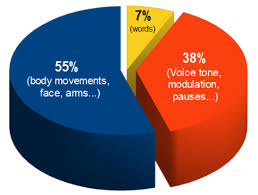A mother and her teenage son were arguing in the kitchen. The issue was what time for him to be home on a weekend night. Standing by the sink, with her arms folded she just could not understand why he was so adamant about being out late.
He sulked in the chair at the kitchen table. “You never listen to me,” he complained.

“Yes, I do,” she countered, “Look, I let you explain for quite a few minutes. I never interrupted; I was as quiet as a church mouse that whole time. What do you want me to do?”
He quickly flashed back, “Listen with your heart, not just your ears!”
“What?”
“Yes, I could tell to everything I said, yes you never responded, but I could tell you had an argument for each thing I said.”
The son was right; he could read her body language and her non-verbal cues. He knew his mother well enough to see that though she was quiet, she wasn’t taking it in. She wasn’t really open to hear from her son. She had already made up her mind; she wasn’t really listening.
Are we really like that?
If we are good listeners we have to work hard so we totally understand the speaker. James 1:19 says, “My dear brothers and sisters, take note of this: Everyone should be quick to listen, slow to speak and slow to become angry…” Listening is the priority over speaking!
 When I first started doing intakes for men coming into Day Seven for counseling, I would come away exhausted from each session, and I couldn’t understand why. The prospective counselee was doing all the talking. But I soon realized listening is hard work, because you have to listen at a number of different levels.
When I first started doing intakes for men coming into Day Seven for counseling, I would come away exhausted from each session, and I couldn’t understand why. The prospective counselee was doing all the talking. But I soon realized listening is hard work, because you have to listen at a number of different levels.
Level #1 – Listening to the Words
The first level, of course is the words. Easy, right? But it takes some work with difficult issues to understand what they are really saying. People use words in different ways, sometimes we don’t even hear correctly. And more importantly we need to understand what they really mean. You will miss them altogether if you address the issue without fully understanding them. So you have to ask good questions to clarify their points.
Level #2 – Observing Non-Verbal Communication
The second level involves the emotions. You “listen” as well through observing them. What does their body language say? Perhaps their arms are crossed or they are looking down as they talk. Perhaps they are staring very intently at you, or they only respond with one-word answers. It is all part of their communication of their feelings to you. Seeing that can help you be more sensitive to them.
Level #3 – Communicationg While Listening
The third level for me is what I am saying to them. Though I am listening to them, I am saying a lot that effects the conversation. The tone of my questions, my sense of humor, my facial expressions, my body language; all tell them how I am reacting to what they are saying.
And lastly there is the level of what is the Lord saying to you in the midst of this conversation. Any significant conversation is a sacred interaction between two creatures made in God’s image. We shouldn’t take that lightly. And it just may be that God has something for that other person that you would not have thought of on your own. He may whisper something to you for them. It may not be an amazing insight, but just the way you phrased a question said something to them. There have been times when somebody reported back to me an amazing breakthrough because of a conversation I had had with them, that I didn’t even remember. Somehow God used me!
So as you are reading this article, are you “listening” to it at all four levels? Are you catching the meaning of what I am saying? I am not there in person, but can you catch the tone of what I am saying? Are you aware of how you are reacting to it? And are you hearing what God is saying to you through it?
Yoo-hoo, are you listening?


